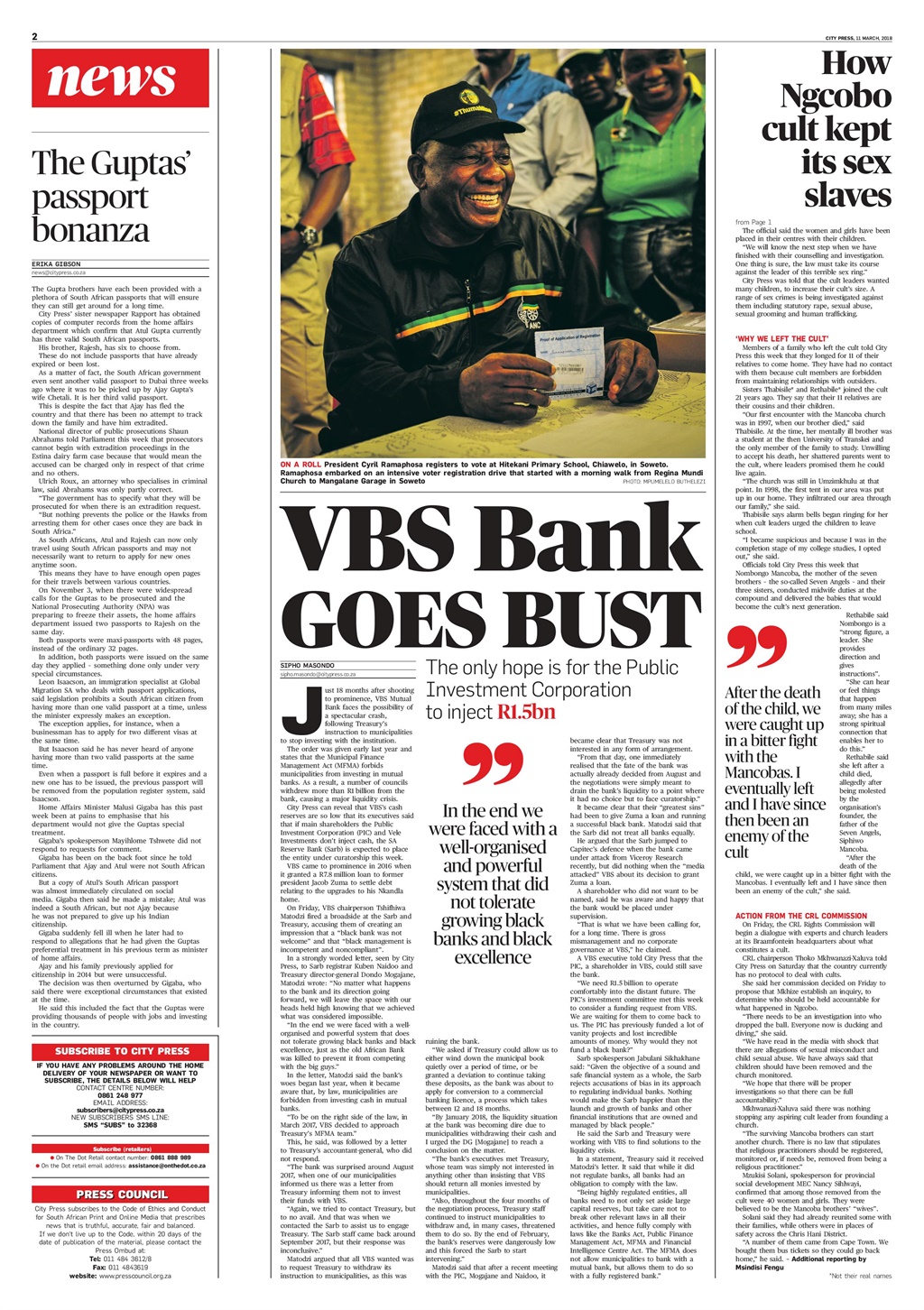
Just 18 months after shooting to prominence, VBS Mutual Bank faces the possibility of a spectacular crash, following Treasury’s instruction to municipalities to stop investing with the institution.
The order was given early last year and states that the Municipal Finance Management Act (MFMA) forbids municipalities from investing in mutual banks. As a result, a number of councils withdrew more than R1 billion from the bank, causing a major liquidity crisis.
City Press can reveal that VBS’s cash reserves are so low that its executives said that if main shareholders the Public Investment Corporation (PIC) and Vele Investments don’t inject cash, the SA Reserve Bank (SARB) is expected to place the entity under curatorship this week.
VBS came to prominence in 2016 when it granted a R7.8 million loan to former president Jacob Zuma to settle debt relating to the upgrades to his Nkandla home.
On Friday, VBS chairperson Tshifhiwa Matodzi fired a broadside at the SARB and Treasury, accusing them of creating an impression that a “black bank was not welcome” and that “black management is incompetent and noncompliant”.
In a strongly worded letter, seen by City Press, to SARB registrar Kuben Naidoo and Treasury director-general Dondo Mogajane, Matodzi wrote: “No matter what happens to the bank and its direction going forward, we will leave the space with our heads held high knowing that we achieved what was considered impossible.
“In the end we were faced with a well-organised and powerful system that does not tolerate growing black banks and black excellence, just as the old African Bank was killed to prevent it from competing with the big guys.”
In the letter, Matodzi said the bank’s woes began last year, when it became aware that, by law, municipalities are forbidden from investing cash in mutual banks.
“To be on the right side of the law, in March 2017, VBS decided to approach Treasury’s MFMA team.”
This, he said, was followed by a letter to Treasury’s accountant-general, who did not respond.
“The bank was surprised around August 2017, when one of our municipalities informed us there was a letter from Treasury informing them not to invest their funds with VBS.
“Again, we tried to contact Treasury, but to no avail. And that was when we contacted the SARB to assist us to engage Treasury. The SARB staff came back around September 2017, but their response was inconclusive.”
Matodzi argued that all VBS wanted was to request Treasury to withdraw its instruction to municipalities, as this was ruining the bank.
“We asked if Treasury could allow us to either wind down the municipal book quietly over a period of time, or be granted a deviation to continue taking these deposits, as the bank was about to apply for conversion to a commercial banking licence, a process which takes between 12 and 18 months.
“By January 2018, the liquidity situation at the bank was becoming dire due to municipalities withdrawing their cash and I urged the DG [Mogajane] to reach a conclusion on the matter.
“The bank’s executives met Treasury, whose team was simply not interested in anything other than insisting that VBS should return all monies invested by municipalities.
“Also, throughout the four months of the negotiation process, Treasury staff continued to instruct municipalities to withdraw and, in many cases, threatened them to do so. By the end of February, the bank’s reserves were dangerously low and this forced the SARB to start intervening.”
Matodzi said that after a recent meeting with the PIC, Mogajane and Naidoo, it became clear that Treasury was not interested in any form of arrangement.
“From that day, one immediately realised that the fate of the bank was actually already decided from August and the negotiations were simply meant to drain the bank’s liquidity to a point where it had no choice but to face curatorship.”
It became clear that their “greatest sins” had been to give Zuma a loan and running a successful black bank. Matodzi said that the SARB did not treat all banks equally.
He argued that the SARB jumped to Capitec’s defence when the bank came under attack from Viceroy Research recently, but did nothing when the “media attacked” VBS about its decision to grant Zuma a loan.
A shareholder who did not want to be named, said he was aware and happy that the bank would be placed under supervision.
“That is what we have been calling for, for a long time. There is gross mismanagement and no corporate governance at VBS,” he claimed.
A VBS executive told City Press that the PIC, a shareholder in VBS, could still save the bank.
“We need R1.5 billion to operate comfortably into the distant future. The PIC’s investment committee met this week to consider a funding request from VBS. We are waiting for them to come back to us. The PIC has previously funded a lot of vanity projects and lost incredible amounts of money. Why would they not fund a black bank?”
SARB spokesperson Jabulani Sikhakhane said: “Given the objective of a sound and safe financial system as a whole, the SARB rejects accusations of bias in its approach to regulating individual banks. Nothing would make the SARB happier than the launch and growth of banks and other financial institutions that are owned and managed by black people.”
He said the SARB and Treasury were working with VBS to find solutions to the liquidity crisis.
In a statement, Treasury said it received Matodzi’s letter. It said that while it did not regulate banks, all banks had an obligation to comply with the law.
“Being highly regulated entities, all banks need to not only set aside large capital reserves, but take care not to break other relevant laws in all their activities, and hence fully comply with laws like the Banks Act, Public Finance Management Act, MFMA and Financial Intelligence Centre Act. The MFMA does not allow municipalities to bank with a mutual bank, but allows them to do so with a fully registered bank.”




 Publications
Publications
 Partners
Partners








